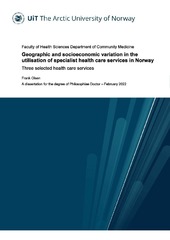Geographic and socioeconomic variation in the utilisation of specialist health care services in Norway – Three selected health care services
Permanent link
https://hdl.handle.net/10037/25374Date
2022-06-21Type
Doctoral thesisDoktorgradsavhandling
Author
Olsen, FrankAbstract
The overall theme of this thesis is geographic and socioeconomic variation in the use of specialist health care services. Three different health care services were studied. Complete population data on individual level with high level of quality from nationwide registries (i.e., The Norwegian Patient Registry, The Cancer Registry of Norway and Statistics Norway) were used in the analysis.
The main aims of the thesis were to: 1) explore geographic variation in the use of three different health care services in Norway, 2) explore socioeconomic variation in the use of three different health care services in Norway, and 3) investigate whether geographic variation in the use of these health care services can be explained by differences in socioeconomic status.
In paper I, hospital admissions for children aged 1-16 years were studied. In paper II, cancer patient pathways (CPP) for lung, colorectal, prostate or breast cancer were studied, and the focus was on two different proportions; i) the proportion of patients in cancer patients pathways who do not have the relevant cancer, and ii) the proportion of cancer patients included in cancer patient pathways. In paper III patients with atrial fibrillation and the proportion treated with ablation were studied.
Substantial geographic and socioeconomic variation was documented, and possible differences in socioeconomic status could not explain the geographic variation. Children of parents with low educational level had the highest admission probability, the highest number of admissions, but the reason for the admission tended to be less severe. Cancer patients in high income groups had the highest probability of being included in cancer patient pathways, while for the patients included in the cancer patient pathways, no systematic differences in the proportion of patients who do not have the relevant cancer were found with income and education groups. Atrial fibrillation patients with high level of education and high income were more frequently treated with ablation, and the education effect increased with increasing age.
The variation documented in this thesis challenges the idea that the distribution of medical practice and care in Norway is rational and evidence-based. Differences in capacity can probably explain some of the geographic variation, and differences in need might explain some of the socioeconomic variation. However, in search of explanations one must also study the impact of personal beliefs in both patients and physicians, local traditions, and clinical practice.
Bakgrunn og målsettinger I Norge er det en overordnet helsepolitisk målsetting at alle skal få et likeverdig helsetilbud, uavhengig av hvor man bor og sosial status. Tre ulike typer helsetjenester ble analysert: i) Sykehusinnleggelser for barn, ii) Andelen i pakkeforløp for kreft som ikke hadde kreft og andelen kreftpasienter som ble inkludert i pakkeforløp, og iii) Andelen av atrieflimmerpasienter som fikk utført ablasjonsbehandling. De overordnede målsettingene i denne avhandlingen var å; 1) utforske geografisk variasjon, 2) utforske sosioøkonomisk variasjon, og 3) undersøke hvorvidt geografisk variasjon i forbruk av disse helsetjenestene kunne forklares med forskjeller i sosioøkonomisk status.
Metoder Komplette populasjonsdata på individnivå for hele Norge, fra nasjonale registre (Norsk Pasient Register, Kreftregisteret og Statistisk sentralbyrå), ble benyttet i analysene. Ulike typer av multippel regresjon ble brukt; Overlevelsesanalyse (binær logistisk regresjon), trunkert negativ binomial regresjon, lineær regresjon, logistisk regresjon og Cox regresjon. Flernivåanalyse ble brukt for å undersøke om geografisk variasjon kunne forklares med sosioøkonomisk status. I tillegg ble kjønns- og aldersjusterte forbruksrater beregnet.
Resultater Betydelig geografisk og sosioøkonomisk variasjon ble funnet. Den geografiske variasjonen kunne ikke forklares ved forskjeller i sosioøkonomi. Barn med foreldre med lavt utdanningsnivå hadde størst sannsynlighet for å bli innlagt og samtidig de minst alvorlige innleggelsene. Kreftpasienter i den høyeste inntektsgruppen ble i størst grad inkludert i pakkeforløp. Atrieflimmerpasienter med høy utdanning og/eller høy inntekt ble oftere behandlet med ablasjon, og utdanningseffekten var sterkere med økende alder.
Konklusjon Kapasitetsforskjeller kan antagelig forklare deler av den geografiske variasjonen, og forskjeller i behov kan antagelig forklare noe av den sosioøkonomiske variasjonen. For å forstå årsakene til variasjon må man også studere hva som ligger bak kliniske beslutninger, dvs. både pasientenes og legenes preferanser, samt lokale tradisjoner og klinisk praksis.
Has part(s)
Paper I: Olsen, F., Balteskard, L., Uleberg, B., Jacobsen, B.K., Heuch, I. & Moen, A. (2021). Impact of parents’ education on variation in hospital admissions for children: a population-based cohort study. BMJ Open, 11(6), e046656. Also available in Munin at https://hdl.handle.net/10037/21590.
Paper II: Olsen, F., Jacobsen, B.K., Heuch, I., Tveit, K.M. & Balteskard, L. (2021). Equitable access to Cancer Patient Pathways in Norway - A national registry-based study. BMC Health Services Research, 21, 1272. Also available in Munin at https://hdl.handle.net/10037/24015.
Paper III: Olsen, F., Uleberg, B., Jacobsen, B.K., Heuch, I., Tande, P., Bugge, E. & Balteskard, L. (2022). Socioeconomic and regional differences in ablation of atrial fibrillation in Norway - a national cohort study. BMC Public Health, 22, 303. Also available in Munin at https://hdl.handle.net/10037/25373.
Related research data
The studies are based on secondary use of clinical administrative data. For this reason, approval from Regional Committees for Medical and Health Research Ethics (REK) is not required, but REK has given exemption from the duty of confidentiality (ref. 20627/REK sør-øst A). The project has conducted a Data Protection Impact Assessment (DPIA). The original data were not collected by the authors, but made available by record-linkage, using the unique 11 digits personal ID, between NPR, CRN and SSB (NPR ref. 18/28584-13, CRN ref. 18/265 DU-3294 and SSB ref. W19/0477).Publisher
UiT The Arctic University of NorwayUiT Norges arktiske universitet
Metadata
Show full item recordCollections
The following license file are associated with this item:


 English
English norsk
norsk
